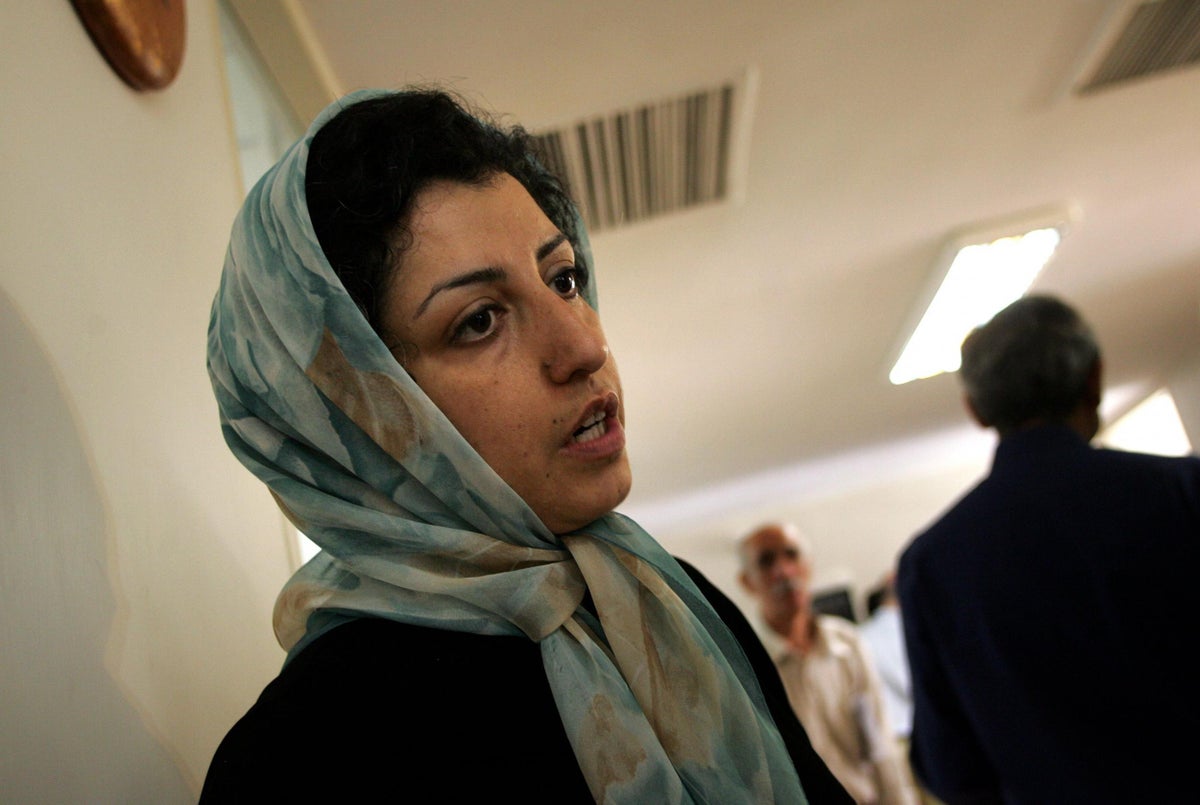
Narges Mohammadi, an activist serving a 10-year sentence in an Iranian prison, was awarded the 2023 Nobel Peace Prize on Friday “for her fight against the oppression of women”.
The decision comes after more than a year of protests, spearheaded by women, that followed the death of 22-year-old Mahsa Amini in the custody of the country’s morality police. Unrest spread rapidly, with demands ranging from greater freedoms to an overthrow of the regime.
Mohammadi is the 19th woman to win the Nobel Peace Prize, and the second Iranian woman, after human rights activist Shirin Ebadi won the award in 2003.
“She fights for women against systematic discrimination and oppression,” the head of the Norwegian Nobel Committee, Berit Reiss-Andersen, said at the announcement in Oslo. Mohammadi supports the struggle for women to live “full and dignified lives” and is a “freedom fighter”, Ms Reiss-Andersen said.
Mohammadi, 51, has kept up her activism from inside Tehran’s Evin Prison, where she is currently serving multiple sentences totalling more than a decade. An engineer by training, she has been imprisoned 13 times and convicted five times during her years of campaigning.
Ms Reiss-Andersen began her announcement in Farsi, saying “Woman, life, freedom” – one of the slogans of the protests. Images of Iranian women defiantly setting their headscarves on fire and chanting the phrase have spread around the world over the past year.
Mohammadi was behind bars as the protests grew nationwide, sparking one of the most intense challenges ever to Iran’s theocracy since the country’s 1979 Islamic Revolution. More than 500 people were killed in a heavy security crackdown, while more than 22,000 others have been arrested. But Mohammadi, 51, has kept up her activism and has remained a leading light for the protests.
In a statement, Mohammadi said that the global support for, and recognition of, her human rights advocacy makes her “more resolved, more responsible, more passionate and more hopeful”.
“I also hope this recognition makes Iranians protesting for change stronger and more organised. Victory is near,” she said.
The authorities arrested Mohammadi last November after she attended a memorial for someone who had died during protests in 2019. The protests began over fuel prices, but morphed into a broader show of dissent, which was crushed by security forces in a bloody crackdown. Charges against Mohammadi – which the international community have decried – include spreading propaganda against the state.
Nazanin Zaghari-Ratcliffe, a British-Iranian national who spent time in Evin Prison with Mohammadi before being released in March 2022, said her friend was “an inspiration”.
“[The announcement] makes me cry. She did so much for all of us in Evin. Narges is an inspiration and a pillar to the women in the female ward in Evin, for her fearless fight against violations of women’s rights, the use of solitary confinement, and execution in the judicial system in Iran,” she told the BBC.
Ms Reiss-Andersen said the peace prize award also recognises the hundreds of thousands of people who have demonstrated against Iran’s discrimination against and oppression of women.
“This prize is first and foremost a recognition of the very important work of a whole movement in Iran, with its undisputed leader, Narges Mohammadi,” she said, adding: “Only by embracing equal rights for all can the world achieve the fraternity between nations that [prize founder] Alfred Nobel sought to promote.”
Mohammadi has a long history of imprisonment, harsh sentences, and international calls for reviews of her case. She has been arrested around a dozen times, and has faced several convictions by the Iranian state.
“If the Iranian authorities make the right decision, they will release her so that she can be present to receive this honour, which is what we primarily hope for,” Ms Reiss-Andersen said.
There was no immediate official reaction from Tehran, which claims that the protests against the state are Western-led subversion. But the semi-official news agency Fars said Mohammadi had “received her prize from Westerners”.
Mohammadi’s husband, Taghi Rahmani, applauded in his home in Paris as he watched the announcement on television. “This Nobel Prize will embolden Narges’ fight for human rights, but more importantly, this is in fact a prize for the ‘women, life and freedom’ movement,” he said.
Before being jailed, Mohammadi was vice-president of the banned Defenders of Human Rights Center in Iran. Ms Ebadi founded the centre. Ms Ebadi left Iran after the disputed re-election of the then president, Mahmoud Ahmadinejad, in 2009, which touched off unprecedented protests and harsh crackdowns by the authorities.
“I congratulate Narges Mohammadi and all Iranian women for this prize ... this prize will shed light on violation of women’s rights in the Islamic Republic ... which unfortunately has proven that it cannot be reformed,” Ms Ebadi said.
According to the will of Alfred Nobel, the prize should be awarded to the person “who has done the most or best to advance fellowship among nations, the abolition or reduction of standing armies, and the establishment and promotion of peace congresses”. Previous winners of the prize – which can be awarded to individuals or organisations – include Nelson Mandela, Barack Obama, Mikhail Gorbachev, Aung San Suu Kyi, and the United Nations.
Last year’s prize was won by human rights activists from Ukraine, Belarus and Russia, in what was seen as a strong rebuke to Vladimir Putin in the wake of his invasion of Ukraine.
Unlike the other Nobel prizes, which are selected and announced in Stockholm, the peace prize is awarded in Oslo by the five-member Norwegian Nobel Committee. The prizes are handed out at ceremonies in December; they carry a cash award of 11 million Swedish kronor (about £820,000). Winners also receive an 18-carat gold medal and a diploma.
Reuters and Associated Press contributed to this report







